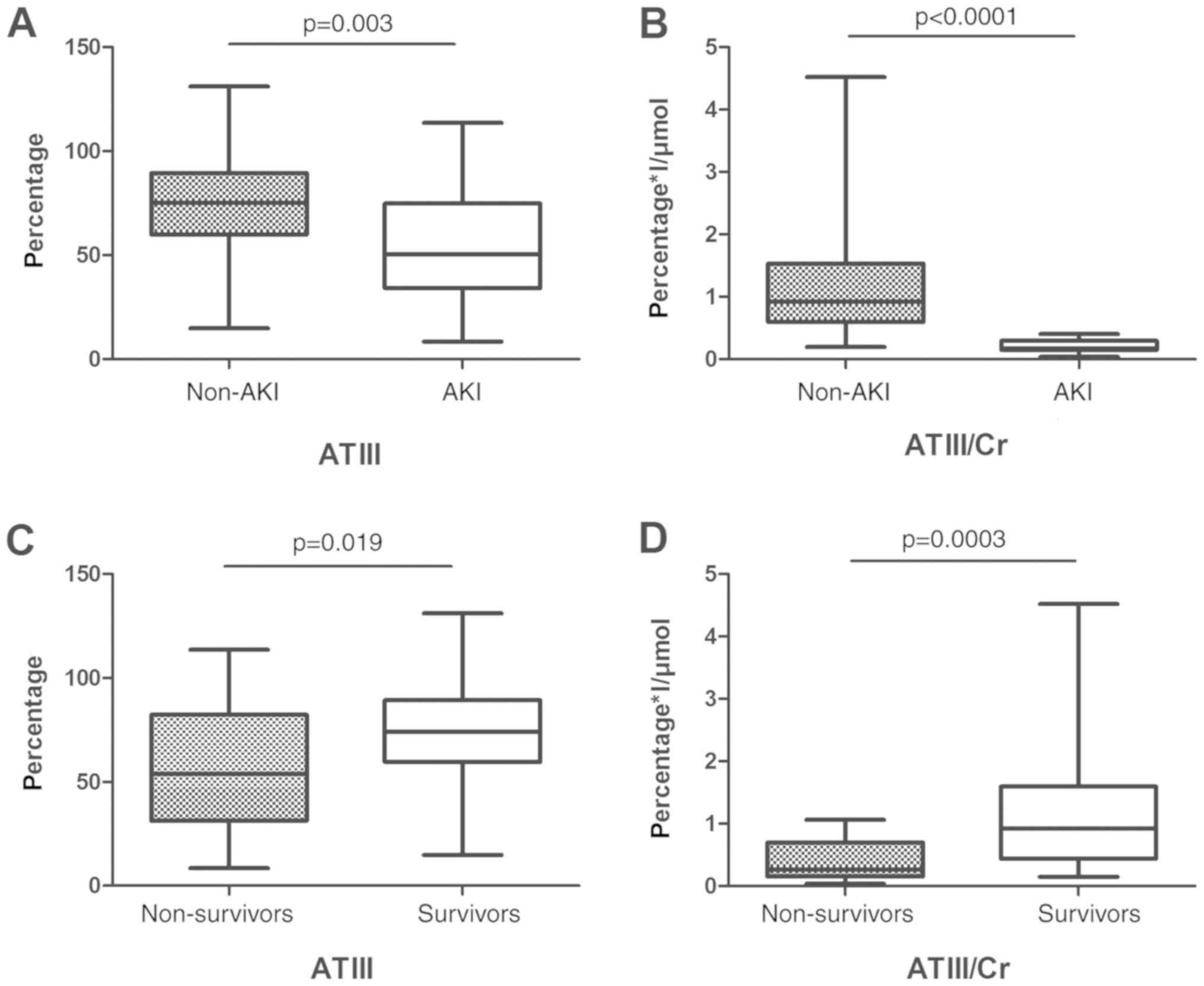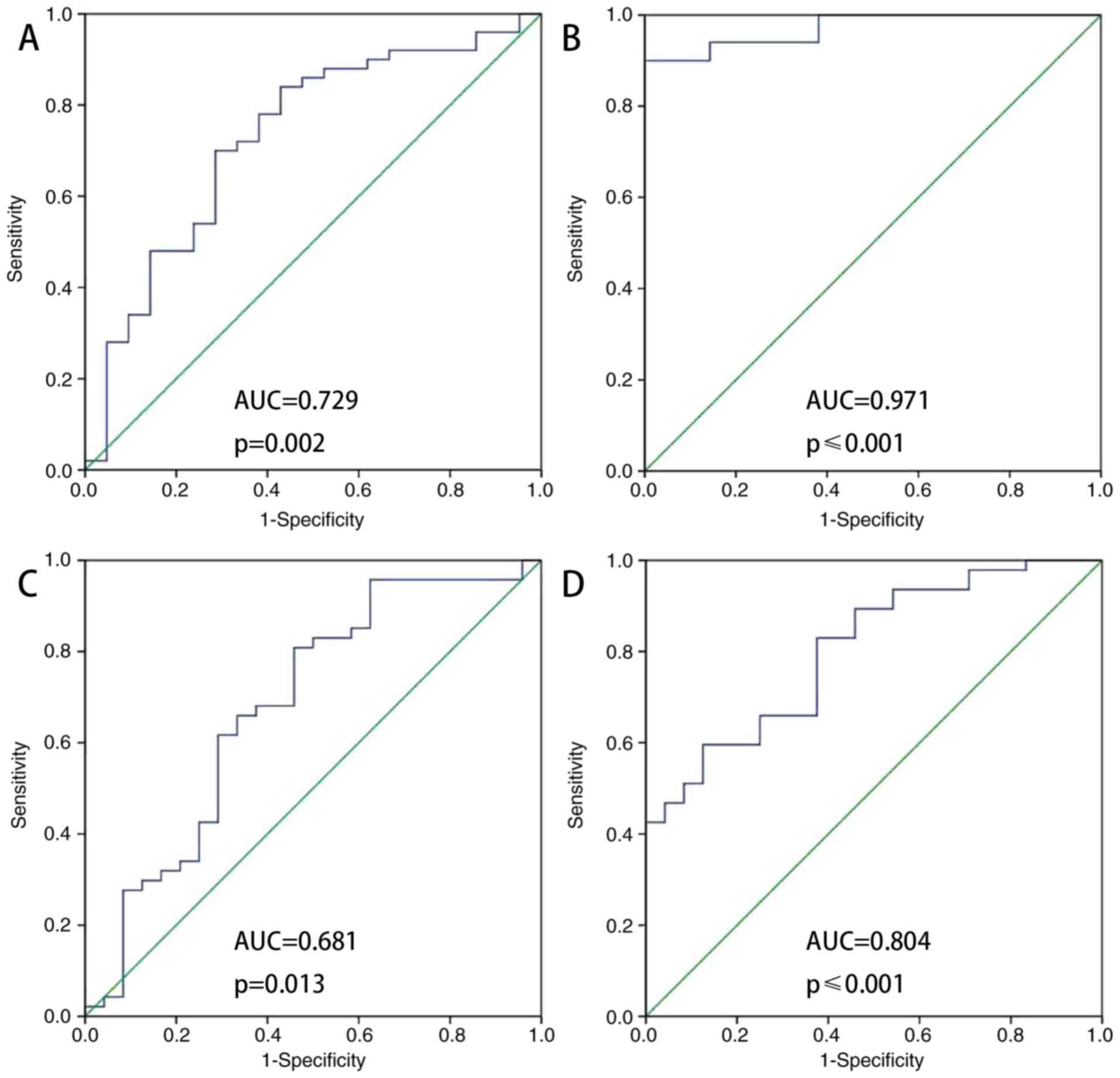|
1
|
Godin M, Murray P and Mehta RL: Clinical
Approach to the patient with AKI and Sepsis. Semin Nephrol.
35:12–22. 2015. View Article : Google Scholar : PubMed/NCBI
|
|
2
|
Gomez H, Ince C, De Backer D, Pickkers P,
Payen D, Hotchkiss J and Kellum JA: A unified theory of
sepsis-induced acute kidney injury: Inflammation, microcirculatory
dysfunction, bioenergetics, and the tubular cell adaptation to
injury. Shock. 41:3–11. 2014. View Article : Google Scholar : PubMed/NCBI
|
|
3
|
Cao Y and Wang RH: Associations among
metabolism, circadian rhythm and age-associated diseases. Aging
Dis. 8:314–333. 2017. View Article : Google Scholar : PubMed/NCBI
|
|
4
|
Wen X, Peng Z and Kellum JA: Pathogenesis
of acute kidney injury: Effects of remote tissue damage on the
kidney. Contrib Nephrol. 174:129–137. 2011. View Article : Google Scholar : PubMed/NCBI
|
|
5
|
Post EH, Kellum JA, Bellomo R and Vincent
JL: Renal perfusion in sepsis: From macro- to microcirculation.
Kidney Int. 91:45–60. 2017. View Article : Google Scholar : PubMed/NCBI
|
|
6
|
Regueira T, Andresen M, Mercado M and
Downey P: Physiopathology of acute renal failure during sepsis. Med
Intensiva. 35:424–432. 2011. View Article : Google Scholar : PubMed/NCBI
|
|
7
|
Kaifei W, Sheling X, Kun X, Peng Y, Wanxue
H and Lixin X: Biomarkers of sepsis-induced acute kidney injury.
BioMed Res International. 2018:1–7. 2018.
|
|
8
|
Lentini P, de Cal M, Clementi A, D'Angelo
A and Ronco C: Sepsis and AKI in ICU patients: The role of plasma
biomarkers. Crit Care Res Pract. 2012:8564012012.PubMed/NCBI
|
|
9
|
Levy JH, Sniecinski RM, Welsby IJ and Levi
M: Antithrombin: Anti-inflammatory properties and clinical
applications. Thromb Haemost. 115:712–728. 2016. View Article : Google Scholar : PubMed/NCBI
|
|
10
|
Lu Z, Cheng D, Yin J, Wu R, Zhang G, Zhao
Q, Wang N, Wang F and Liang M: Antithrombin III protects against
contrast-induced nephropathy. EBioMedicine. 17:101–107. 2017.
View Article : Google Scholar : PubMed/NCBI
|
|
11
|
Zhao Q, Yin J, Lu Z, Kong Y, Zhang G, Zhao
B and Wang F: Sulodexide protects contrast-induced nephropathy in
Sprague-Dawley rats. Cell Physiol Biochem. 40:621–632. 2016.
View Article : Google Scholar : PubMed/NCBI
|
|
12
|
Wang F, Zhang G, Lu Z, Geurts AM, Usa K,
Jacob HJ, Cowley AW, Wang N and Liang M: Antithrombin III/SerpinC1
insufficiency exacerbates renal ischemia/reperfusion injury. Kidney
Int. 88:796–803. 2015. View Article : Google Scholar : PubMed/NCBI
|
|
13
|
Lu Z, Wang F and Liang M:
SerpinC1/Antithrombin III in kidney-related diseases. Clin Sci
(Lond). 131:823–831. 2017. View Article : Google Scholar : PubMed/NCBI
|
|
14
|
Seymour CW, Liu VX, Iwashyna TJ,
Brunkhorst FM, Rea TD, Scherag A, Rubenfeld G, Kahn JM,
Shankar-Hari M, Singer M, et al: Assessment of clinical criteria
for sepsis: For the third international consensus definitions for
sepsis and septic shock (Sepsis-3). JAMA. 351:762–774. 2016.
View Article : Google Scholar
|
|
15
|
Abdel-Rahman EM and Okusa MD: Effects of
aging on renal function and regenerative capacity. Nephron Clin
Prac. 127:15–20. 2014. View Article : Google Scholar
|
|
16
|
Levey AS, Bosch JP, Lewis JB, Greene T,
Rogers N and Roth D: A more accurate method to estimate glomerular
filtration rate from serum creatinine: A new prediction Equation.
Modification of Diet in Renal Disease Study Group. Ann Intern Med.
130:461–470. 1999. View Article : Google Scholar : PubMed/NCBI
|
|
17
|
Siew ED, Matheny ME, Ikizler TA, Lewis JB,
Miller RA, Waitman LR, Go AS, Parikh CR and Peterson JF: Commonly
used surrogates for baseline renal function affect the
classification and prognosis of acute kidney injury. Kidney Int.
77:536–542. 2010. View Article : Google Scholar : PubMed/NCBI
|
|
18
|
Liu WS, Chung YT, Yang CY, Lin CC, Tsai
KH, Yang WC, Chen TW, Lai YT, Li SY and Liu TY: Serum creatinine
determined by Jaffe, Enzymatic method, and isotope dilution-liquid
chromatography-mass spectrometry in patients under hemodialysis. J
Clin Lab Anal. 26:206–214. 2012. View Article : Google Scholar : PubMed/NCBI
|
|
19
|
Allingstrup M, Wetterslev J, Ravn FB,
Møller AM and Afshari A: Antithrombin III for critically ill
patients: A systematic review with meta-analysis and trial
sequential analysis. Intensive Care Med. 42:505–520. 2016.
View Article : Google Scholar : PubMed/NCBI
|
|
20
|
Kong Y, Yin J, Cheng D, Lu Z, Wang N, Wang
F and Liang M: Antithrombin III Attenuates AKI following acute
severe pancreatitis. Shock. 49:572–579. 2018. View Article : Google Scholar : PubMed/NCBI
|
|
21
|
Katayama S, Nunomiya S, Koyama K, Wada M,
Koinuma T, Goto Y, Tonai K and Shima J: Markers of acute kidney
injury in patients with sepsis: The role of soluble thrombomodulin.
Crit Care. 21:2292017. View Article : Google Scholar : PubMed/NCBI
|
|
22
|
Wang F, Peng C, Zhang G, Zhao Q, Xuan C,
Wei M and Wang N: Delayed kidney injury following coronary
angiography. Exp Ther Med. 12:530–534. 2016. View Article : Google Scholar : PubMed/NCBI
|
|
23
|
Souter PJ, Thomas S, Hubbard AR, Poole S,
Römisch J and Gray E: Antithrombin inhibits
lipopolysaccharide-induced tissue factor and interleukin-6
production by mononuclear cells, human umbilical vein endothelial
cells, and whole blood. Crit Care Med. 29:134–139. 2001. View Article : Google Scholar : PubMed/NCBI
|
|
24
|
Ostrovsky L, Woodman RC, Payne D, Teoh D
and Kubes P: Antithrombin III prevents and rapidly reverses
leukocyte recruitment in ischemia/reperfusion. Circulation.
96:2302–2310. 1997. View Article : Google Scholar : PubMed/NCBI
|

















